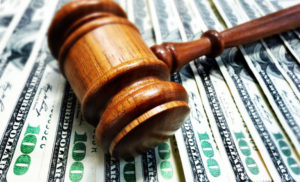No one expects to be injured in an accident. However, it happens every day throughout Florida. Individuals are injured in car accidents and slip & fall accidents. They are also injured because of medical malpractice and construction accidents. Many situations and accidents can lead to severe injuries.
If another party caused your injury, you could receive compensation for damages caused by the accident and injury. Economic damages are a common type of compensation included in personal injury claims.
What Are Damages?

Damages in a personal injury case refer to the amount of money you receive from the party who caused the accident or your injury.
The legal system cannot undo the harm caused by another party. The only way it has to compensate accident victims is to hold the at-fault party financially liable for the pain, suffering, financial losses from things like lost wages and medical expenses, and other harm the victim experiences because of the injury or accident.
Damages include a variety of harm caused by an injury or accident. The two main categories of damages in a personal injury case are economic damages and non-economic damages. With each category of damages, numerous items can be included.
What Are Economic Damages in a Florida Personal Injury Case?
Economic damages include the financial losses and expenses related to the accident and your injuries. When you are injured in an accident, you may incur a variety of expenses and losses. You can include the economic losses in the injury claim against the party who caused the accident.
Examples of economic damages included in most personal injury claims are:
Cost of Medical Treatment and Care

The cost of your medical treatment and care can be costly. A minor injury could result in thousands of dollars in medical care. The cost to treat catastrophic injuries, such as traumatic brain injuries, broken bones, paralysis, spinal cord injuries, and amputations, can total hundreds of thousands of dollars.
Examples of medical care and treatment include, but are not limited to:
- Bills for physicians and other medical providers
- Hospitalizations, including surgeries and emergency room visits
- Ambulance bills
- Medications and medical supplies
- Physical, vocational, occupational, and other forms of therapy
- Diagnostic tests
In addition to past and present medical bills, you might also recover compensation for future medical treatment. Individuals who sustain permanent impairments and disabilities may require ongoing medical care. Your lawyer may retain medical experts to estimate the amount of future medical care to maximize the compensation you receive for future damages.
Cost of Personal Care and In-Home Health Care
Some individuals require assistance with activities of daily living or in-home health care after they leave the hospital. The cost of paying someone to assist you with dressing, bathing, or eating can be included in economic damages. Also, the cost of paying someone to clean your home, mow the grass, or help with other chores may be considered a valid economic loss.
In-home health care could include a nurse or home health aid. Some individuals may also receive physical therapy or other forms of therapy at home from in-home health care professionals.
Cost of Long-Term Care
Depending on the severity of the injuries, a person may be transferred to a long-term care facility from the hospital. Long-term care facilities provide a higher level of care than in-home health care services. An accident victim who requires 24/7 care or extensive therapy may need long-term care.
Long-term care can be extremely expensive. In some cases, the long-term care cost could be more expensive than being in a hospital. Individuals with permanent impairments may spend months in a long-term care facility as they learn to cope with their disability.
Loss of Income and Benefits
Being unable to work after a motorcycle accident, truck accident, car accident, or another injury can result in a substantial loss of income. Individuals with severe injuries may be unable to return to work for months. Even if they have short-term disability benefits, it does not compensate them for all loss of income.
The loss of income after an accident can create a financial hardship for accident victims.
A settlement agreement or jury award can include compensation for the loss of:
- Wages
- Bonuses
- Salaries
- Commissions
- Self-employment income
- Benefits
- And other forms of income
You will need documentation to prove loss of income. Documentation might include copies of recent tax returns, pay stubs, and profit & loss statements. Your employment may also need to provide a statement with details about the time you missed from work and what you would have earned had you been at work during that period.
Individuals who sustain permanent disabilities and impairments may be unable to work permanently or experience a decrease in earning capacity. If you cannot work because of an impairment, you might receive compensation for future loss of income.
Generally, financial experts are needed to estimate the future loss of income based on several factors. Factors that might be considered when calculating the future loss of income include your age, education, career, experience, skills, and job outlook.
Medical Equipment and Modifications to a Home
Permanent disabilities may also result in the need for special medical equipment. For example, someone with an amputation may need a variety of equipment, including a prosthesis. Someone who experienced a spinal cord injury may need canes, walkers, or wheelchairs.
Additionally, a permanent impairment may require modifications to the person’s home and vehicle to accommodate the impairment. Ramps may be necessary to provide access to a home, or the person may require a specialized vehicle equipped for wheelchairs.
Medical experts may need to testify about the need for these items. Documentation proving the reasonable cost for these items is also required.
Fees and Costs of Filing a Personal Injury Lawsuit
Many personal injury cases settle outside of court. However, your case could be different. You may need to file a personal injury lawsuit to recover the compensation you deserve for your injuries and damages.
If you need to hire a personal injury lawyer and file a lawsuit to protect your rights, you can include a demand for reimbursement of attorneys’ fees and costs as part of your damages. Many attorneys accept personal injury cases on a contingency fee basis. They are not paid until they recover money for your injury claim.
How Do You Calculate Economic Damages?

Economic damages equal the actual expenses or financial losses associated with the accident, your injuries, and your recovery. They also include the future damages caused by a disability or permanent impairment.
Proving economic damages requires careful documentation of your costs and expenses. An attorney can help you document your damages. You can improve your chance of recovering full compensation for economic damages by keeping detailed records and copies of all bills, receipts, and invoices related to the case.
As discussed above, your attorney may hire medical experts, economists, and other financial experts to assist in calculating future damages. The experts provide testimony and evidence to establish the extent of your future damages.
Whether you receive full compensation for all economic damages depends on the facts of your case. If you were 50% or less at fault for the cause of your injury, your compensation could be reduced under Florida’s modified comparative fault laws. If your share of fault exceeds 50%, you may be barred from receiving any compensation for your damages.
If the other party does not have sufficient insurance to cover your claim, you might not receive full compensation for all economic damages.
Call Our Florida Personal Injury Lawyer for a Free Consultation
Our personal injury lawyers in Clearwater explore all options for recovering maximum compensation for economic damages and other damages. Roman Austin Car Accident and Personal Injury Lawyers can help advise you on the viability of your claim and how best to proceed. Contact us to schedule a free consultation at (727) 787-2500.

